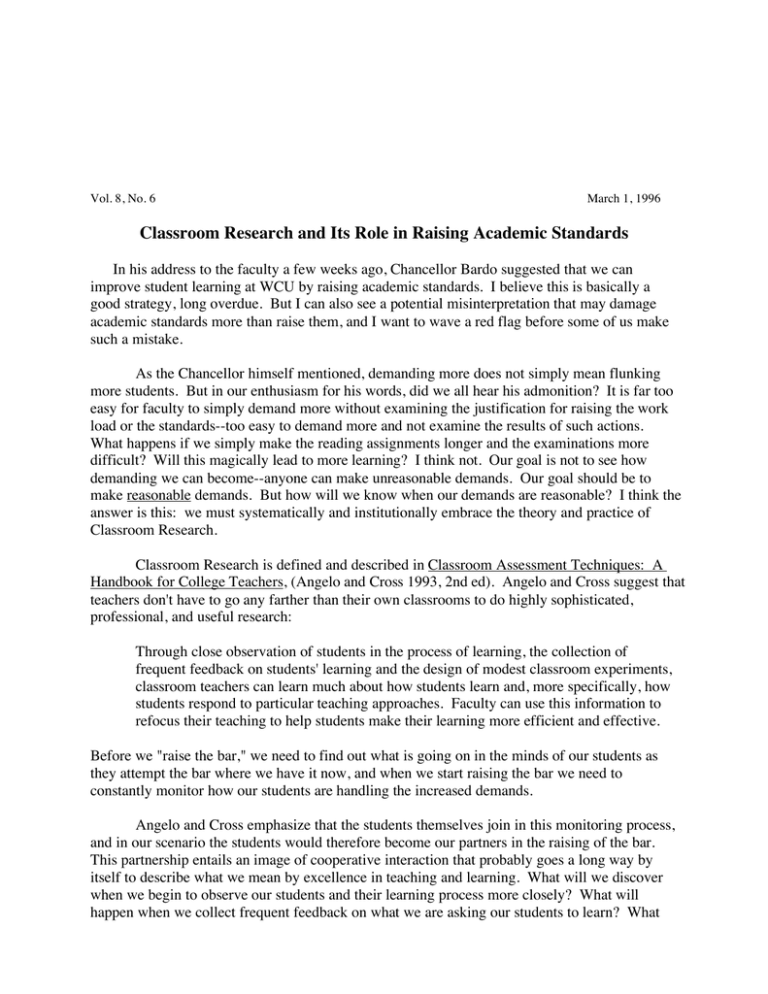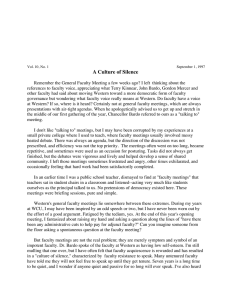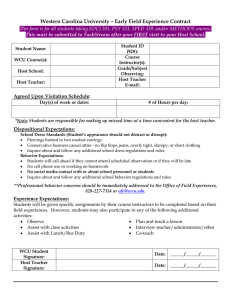Classroom Research and Its Role in Raising Academic Standards
advertisement

Vol. 8, No. 6 March 1, 1996 Classroom Research and Its Role in Raising Academic Standards In his address to the faculty a few weeks ago, Chancellor Bardo suggested that we can improve student learning at WCU by raising academic standards. I believe this is basically a good strategy, long overdue. But I can also see a potential misinterpretation that may damage academic standards more than raise them, and I want to wave a red flag before some of us make such a mistake. As the Chancellor himself mentioned, demanding more does not simply mean flunking more students. But in our enthusiasm for his words, did we all hear his admonition? It is far too easy for faculty to simply demand more without examining the justification for raising the work load or the standards--too easy to demand more and not examine the results of such actions. What happens if we simply make the reading assignments longer and the examinations more difficult? Will this magically lead to more learning? I think not. Our goal is not to see how demanding we can become--anyone can make unreasonable demands. Our goal should be to make reasonable demands. But how will we know when our demands are reasonable? I think the answer is this: we must systematically and institutionally embrace the theory and practice of Classroom Research. Classroom Research is defined and described in Classroom Assessment Techniques: A Handbook for College Teachers, (Angelo and Cross 1993, 2nd ed). Angelo and Cross suggest that teachers don't have to go any farther than their own classrooms to do highly sophisticated, professional, and useful research: Through close observation of students in the process of learning, the collection of frequent feedback on students' learning and the design of modest classroom experiments, classroom teachers can learn much about how students learn and, more specifically, how students respond to particular teaching approaches. Faculty can use this information to refocus their teaching to help students make their learning more efficient and effective. Before we "raise the bar," we need to find out what is going on in the minds of our students as they attempt the bar where we have it now, and when we start raising the bar we need to constantly monitor how our students are handling the increased demands. Angelo and Cross emphasize that the students themselves join in this monitoring process, and in our scenario the students would therefore become our partners in the raising of the bar. This partnership entails an image of cooperative interaction that probably goes a long way by itself to describe what we mean by excellence in teaching and learning. What will we discover when we begin to observe our students and their learning process more closely? What will happen when we collect frequent feedback on what we are asking our students to learn? What will happen when we start asking students more questions about their learning process and really begin to listen to what they say? I believe that we will discover just how much we can reasonably raise academic standards, what the limits might be, and why. We will not be working in the dark simply making more demands. At the same time, we will be establishing a rapport with students that is probably essential to their learning process. Students who become part of Classroom Research activities learn to trust their teachers and to feel some ownership of the classroom, some responsibility for their academic goals. This is very different from the image of the demanding taskmaster, the stern disciplinarian who marks a line in the sand and rewards with high grades the students who are able to "reach the mark." When the faculty stood in Forsyth Auditorium to applaud the Chancellor's speech, how many of us only had that image of the demanding taskmaster in our minds? As Bruce Henderson has counseled us in former Faculty Forum pieces, effective teachers constantly seek that delicate balance between challenge and support. When students feel overwhelmed by academic challenges, they will frequently become frustrated and simply give up, as many of us do in the face of the challenges that frustrate us. Faculty must challenge students in order to energize them, but faculty must also support students on their high wire and convince students that it is safe to try, that there will be a net to catch them if they fall. Too much challenge without sufficient support will simply defeat learning where it might have been quite possible. It will be too easy to respond to the Chancellor's suggestion by simply requiring more from students and grading them more stringently. The key to solving the problem of our students' poor learning habits is to know what those habits are and how to fix them. In the typical classroom, where the teacher does most of the talking and the students simply listen, respond to questions, or engage in discussions, it is too easy for us to miss the real issues and problems that underlie our students' success or failure. Students will not reveal their ignorance, confusion, or even their apathy if they don't have to. When we ask questions, we often receive silence. What does that silence mean? How can we find out? I think that some form of Classroom Research is the only answer. But how do we usually respond to the silence? Too often we are unnerved and go back to talking ourselves, which is just what the student wants who seeks to hide. I believe that to teach well we must try to constantly monitor what is going on in the minds of our students--how much they are understanding, what they are confused by and why, when they are apathetic and why, how they feel and why. I believe that frequently collecting that information in the classroom setting is the secret to quality education and an absolute necessity if we even entertain the idea of "raising standards." At the risk of "not covering the material" we need to stop often and find out where the students are; we must study them--the way we study anything in our area of academic specialization--to find out when they are learning poorly, when they are learning well, and why. Angelo and Cross's book describes dozens of procedures that faculty and students can use in their classrooms to monitor the learning process. But these techniques only serve as models for faculty and students to design procedures of their own that fit their precise needs. What must we do before we decide to "raise the bar. Can WCU be a national leader as a teaching institution? Yes. Can it raise academic standards and make quality education rather than a marketing blitz that simply makes self-congratulating claims? Yes. But we need actions and results, not just more words. We need to accept our responsibility for fixing the problem of poor student learning habits and find a solution that really works. Focusing on Classroom Research will work if we pursue it assiduously because Classroom Research is not a marketing trick. I think we must dedicate ourselves as a faculty to read and study this book. It is responsible scholarship--more important for WCU, I think, than discoveries in our areas of content specialization. What can you do, then, to make higher academic standards and excellence in education a reality at WCU? Start a discussion group on classroom research in your department. Create classroom research exercises of your own. Publish them. Value this kind of work highly and reflect that value explicitly in your department's TPR document. Give tenure and promotion to faculty who are involved in forms of classroom research. And when you recruit new faculty, make it clear to them that this form of scholarship is highly valued at WCU. It will take courage to dedicate ourselves to something so prosaic and simple, something so difficult to market as a "great plan" for improving teaching and learning. But we must have the courage to dedicate ourselves to something that really has a chance to work. Terry Nienhuis, English Send responses to the Faculty Center by the 8th of the month. Your responses will be published in notes & quotes on the 15th.



